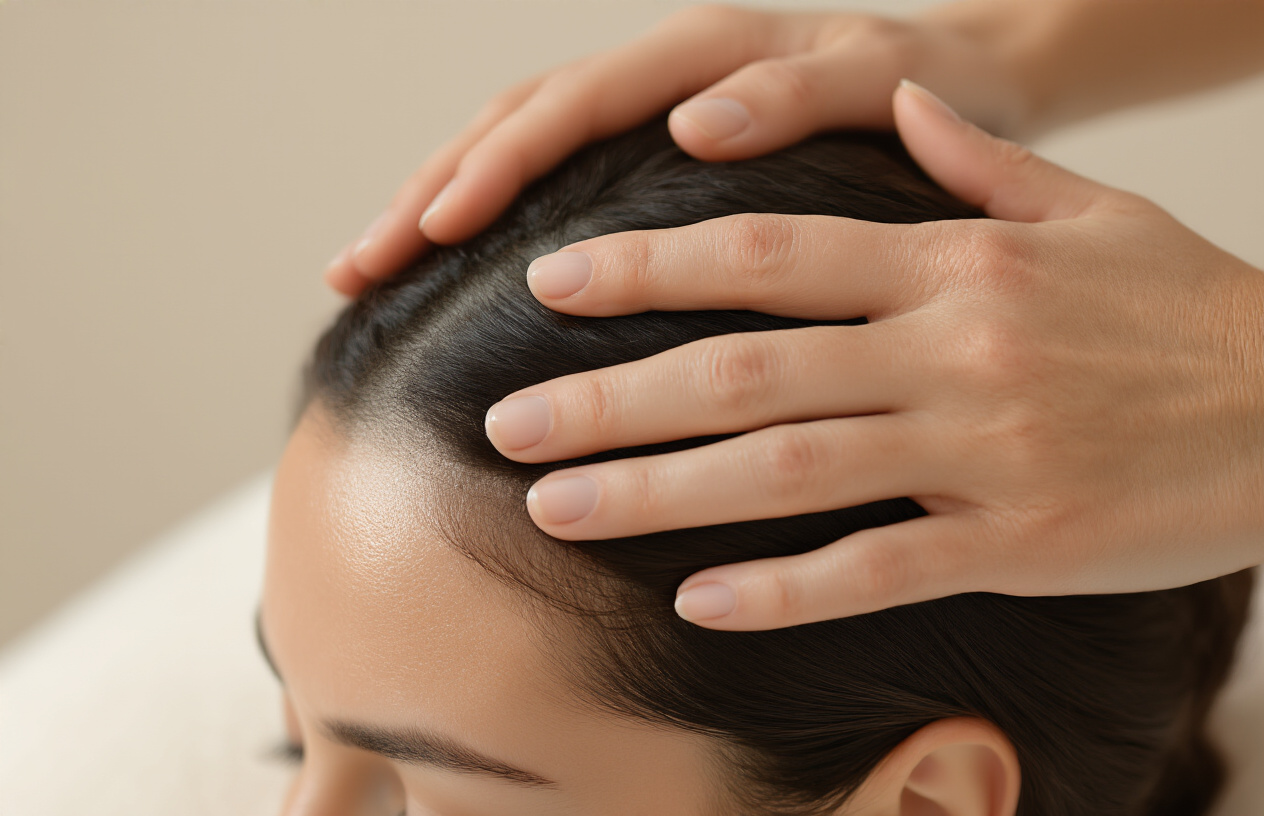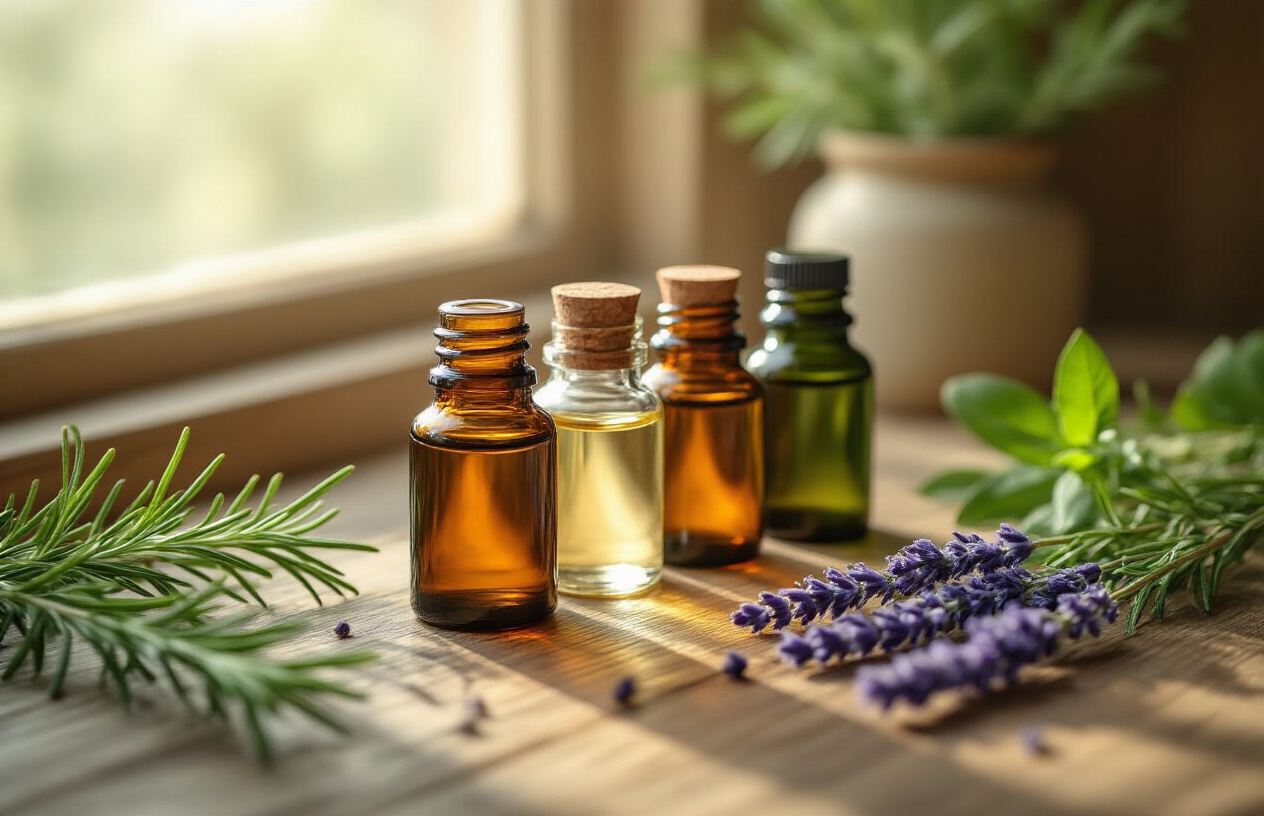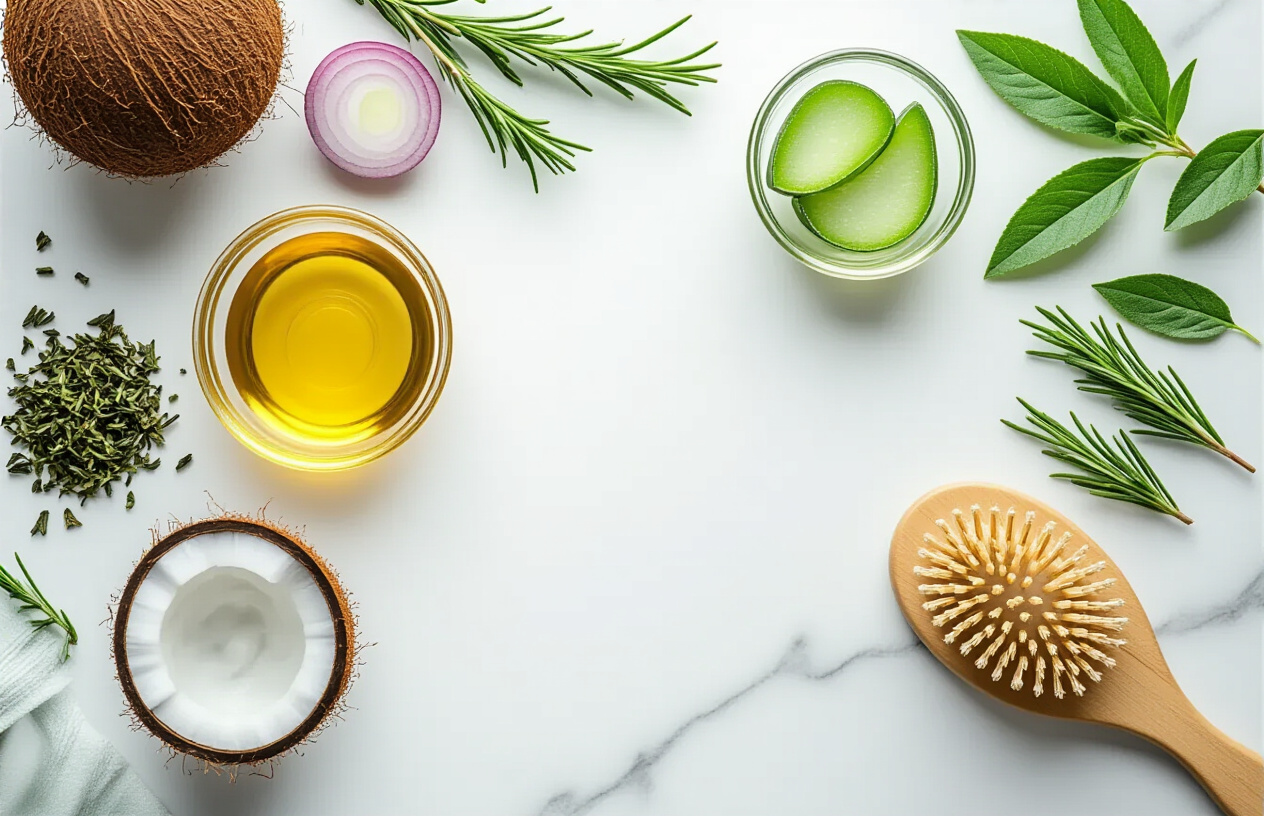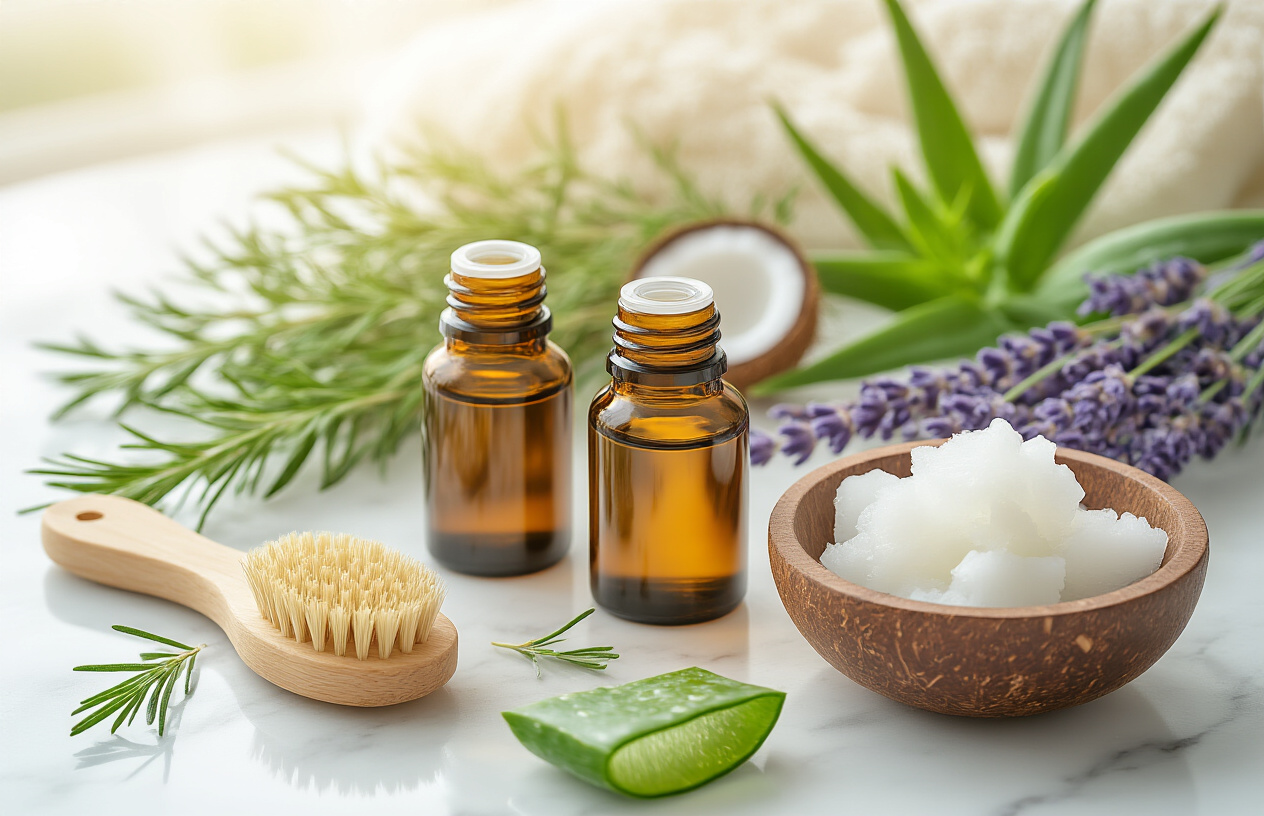Hair fall affects millions of people, and you’re probably here because you’ve noticed more strands in your brush or shower drain than usual. This guide is for anyone dealing with thinning hair, excessive shedding, or early signs of hair loss who wants to try natural remedies for hair fall before turning to expensive treatments or medications.
The good news? Several natural hair loss treatments have real science backing them up. You don’t need to spend hundreds of dollars on fancy products when effective home remedies for thinning hair might already be in your kitchen or local health store.
We’ll dive into proven scalp massage techniques that can boost blood flow to your follicles, explore which essential oils for hair regrowth actually work (spoiler: rosemary oil performs as well as some prescription treatments), and cover the herbal supplements and nutrients your hair needs to grow strong. You’ll also learn what habits might be making your hair loss worse and when it’s time to see a professional.
These natural hair strengthening treatments won’t work overnight, but with consistency and the right approach, you can prevent hair loss naturally and give your hair its best chance to thrive.
Scalp Massage Techniques for Hair Growth

How Daily 4-Minute Scalp Massages Stimulate Hair Follicles
Daily scalp massage for hair growth is a scientifically-backed natural remedy for hair fall. A comprehensive 2019 study demonstrated that consistent 4-minute scalp massages performed over 24 weeks significantly improved hair growth, enhanced blood circulation, and promoted overall scalp health. The massage technique works by creating stretching forces during the massage process, which encourages hair growth and increases thickness in the dermal papilla cells—the essential cellular components responsible for hair regeneration and growth processes.
Using Fingertips vs Specialized Scalp Massager Tools
When performing scalp massage for hair growth, you have two equally effective options. Using your fingertips involves moving across the scalp in small circular motions with light to medium pressure, ensuring you use fingertips rather than fingernails to avoid damage. Alternatively, specialized scalp massager tools are readily available and inexpensive options found online or in local drugstores. Research indicates that using your own fingers to massage your scalp is considered equally effective as using specialized tools, making this natural hair loss treatment accessible to everyone.
Benefits Beyond Hair Growth: Stress Relief and Blood Flow
Scalp massage offers multiple therapeutic benefits extending beyond preventing hair loss naturally. Regular massage sessions effectively relieve stress and tension, which are significant emotional factors that may contribute to hair loss conditions. Additionally, massaging the scalp with hair oils and masks stimulates the scalp area and may improve overall hair thickness. The improved blood flow resulting from consistent massage helps nourish hair follicles, making this one of the most comprehensive home remedies for thinning hair available.
Essential Oils That Promote Hair Regrowth

Rosemary Oil: Natural Alternative to Minoxidil
A 2020 review suggests rosemary oil may stimulate new hair growth and prevent hair loss, with at least one study finding it similarly effective to minoxidil (Rogaine) in promoting hair regrowth. Mix a few drops into a carrier oil and massage into hair and scalp before rinsing, a few times per week, or add daily to shampoo and conditioner.
Peppermint Oil for Increased Blood Circulation
Animal studies demonstrate that peppermint oil stimulates hair growth by increasing blood flow to the scalp due to its vasodilating properties, which make blood vessels larger. Always dilute peppermint oil with another oil before applying and massaging directly into the scalp, and wash hands thoroughly after use to avoid irritation.
Geranium Oil for Boosting Hair Growth and Circulation
A 2017 animal study found that geranium oil promoted hair growth and boosted circulation in mice. Mix three drops with eight drops of carrier oil and apply directly to hair, or add a few drops to shampoo and conditioner for this natural hair loss treatment.
Proper Dilution and Application Methods
Essential oils should always be mixed with a carrier oil like argan or jojoba oil or added to shampoo and conditioner; avoid direct application to the skin. Test any solution on a small patch of skin for a day or two before applying to the scalp. Each remedy should be used every other night or every two to three days, not daily.
Natural Topical Treatments for Stronger Hair

Coconut Oil for Scalp Health and Hair Protection
A 2021 study revealed that applying coconut oil to the scalp may enrich the scalp’s microbiome, promoting healthier scalp and hair follicles. This versatile natural hair loss treatment can be used before or after washing hair – for oily hair types, apply as an overnight or pre-wash leave-in treatment by massaging into scalp and hair. Those with dry hair can benefit from using it as a leave-in treatment. While coconut oil is considered a low-risk option that may help prevent hair loss naturally, research shows limited data for dramatic improvement in hair growth or thickening.
Aloe Vera for Soothing Scalp and Unblocking Follicles
Pure aloe vera gel serves as an effective natural hair strengthening treatment when applied to the scalp a few times per week. This gentle remedy helps soothe irritated scalp conditions, conditions hair strands, reduces dandruff, and most importantly, unblocks hair follicles that may be impeding healthy hair growth. For convenience, you can also incorporate shampoos and conditioners containing aloe vera into your regular hair care routine to maintain consistent scalp health and support your natural remedies for hair fall regimen.
Onion Juice for Treating Patchy Hair Loss
Research from 2014 demonstrates that onion juice may effectively promote hair growth and treat patchy alopecia areata, an autoimmune condition causing hair loss. A 2015 animal study further supported these findings, showing that onion juice improves keratinocyte growth factor, which is crucial for hair follicle development. To prepare this home remedy for thinning hair, blend onions and squeeze out the fresh juice, then apply to scalp and hair for at least 15 minutes before shampooing. The sulfur content in onion juice is believed to strengthen hair, reduce inflammation, and hydrate the scalp while improving circulation.
Lemon Oil for Maintaining Healthy Scalp
A 2016 animal study suggested that lemon oil may help maintain a healthy scalp and encourage hair growth, while a 2021 review highlighted sinapic acid, a bioactive chemical in lemons, as a potential hair growth promoter. To incorporate this natural hair loss treatment, apply fresh lemon juice directly to your scalp and hair 15 minutes before shampooing, or create a nourishing hair mask using lemon essential oil diluted in a carrier oil for enhanced scalp health and hair strengthening benefits.
Herbal Supplements and Nutrients for Hair Health

Herbal Supplements and Nutrients for Hair Health
Now that we have covered topical treatments, let’s explore herbal supplements for hair health that can work from within to strengthen your hair follicles and promote natural hair growth remedies.
Red Ginseng for Activating Hair Follicles
Red ginseng supplements may promote hair growth by stimulating hair follicles through ginsenosides, the active components. Studies have shown red ginseng can improve hair growth in mice, thickening hair and transitioning hair follicles from resting to active phases. This natural hair loss treatment is considered low risk and may offer some benefit, but needs to be diluted with another oil or used sparingly in droplet form.
Viviscal Supplements with Marine Proteins and Biotin
Viviscal contains marine proteins from shark and mollusk powder, organic silica, vitamin C from acerola cherry, biotin, and zinc. These herbal supplements for hair health may help regenerate new cells and strengthen existing cells. Pills should be taken twice daily for at least 6 months to see results. Viviscal also offers complementary shampoo and conditioner products.
Fish Oil and Omega Fatty Acids for Hair Density
Fish oil supplements are rich in nutrients like proteins and omega fatty acids that support natural hair strengthening treatments. A 2015 study indicated that an omega supplement combined with antioxidants helped improve hair density, diameter, and reduce hair loss, making it an effective component in how to stop hair fall naturally.
Safe Supplement Usage and Expected Timeline
Always speak with a healthcare professional before introducing supplements and follow the manufacturer’s recommended dosage. Always take supplements as directed and check for possible side effects. Patience is required with these natural remedies for hair fall, as it could take three to six months to see noticeable results with natural remedies.
What to Avoid and When to Seek Professional Help

Harmful Ingredients in Hair Care Products
Avoid hair care products containing alcohol as one of the first three ingredients, as it dries out both hair and scalp, leading to breakage. Since anything applied to the scalp is absorbed into the bloodstream, choose products with clean, low-chemical formulations. Look for beneficial ingredients like caffeine, menthol, or mint that increase blood flow to the scalp. Harmful practices also include damage from bleach and hair dyes.
Warning Signs That Require Medical Attention
Now that we’ve covered natural remedies for hair fall, it’s crucial to recognize when professional help is needed. Consult a healthcare professional if you’re losing more hair than average, especially when combined with symptoms like fatigue, anxiety, itching, or mood changes. Working with a healthcare provider to identify the root cause of hair loss is the essential first step in effective treatment.
FDA-Approved Treatments vs Natural Remedies
With this in mind, understanding your treatment options is vital. FDA-approved medications are available for hair loss, and speaking to a doctor can determine your eligibility. Healthcare professionals may recommend specially formulated shampoos, supplements, or prescription medications depending on your hair loss’s underlying cause. Interestingly, rosemary oil has shown similar effectiveness to minoxidil, an over-the-counter hair-growth medication. Consider consulting a doctor about medications or procedures if natural methods don’t provide desired results.
Realistic Timeline Expectations for Natural Methods
Previously mentioned natural hair strengthening treatments require patience, as these natural remedies for hair fall typically take three to six months to yield noticeable results. Research demonstrates this timeline’s validity – one study on scalp massage for hair growth involved daily 4-minute massages over 24 weeks to achieve measurable improvements, highlighting the commitment needed for natural hair loss treatment success.

Hair loss can be distressing, but these five natural remedies offer hope for those seeking gentler alternatives to conventional treatments. From the circulation-boosting benefits of scalp massage and essential oils like rosemary and peppermint, to the strengthening properties of natural topical treatments and targeted herbal supplements, each approach works differently to support hair health. Remember that these remedies work best when applied topically every other night rather than daily, and patience is key—results typically take three to six months to become noticeable.
While natural remedies can be highly effective, it’s crucial to avoid harsh ingredients like alcohol in hair products and to test any new treatment on a small patch of skin first. If you’re experiencing excessive hair loss accompanied by symptoms like fatigue, mood changes, or scalp irritation, don’t hesitate to consult a healthcare professional. They can help identify underlying causes and recommend whether these natural approaches should be combined with medical treatments for optimal results. With consistency and the right approach, you can take meaningful steps toward healthier, stronger hair naturally.